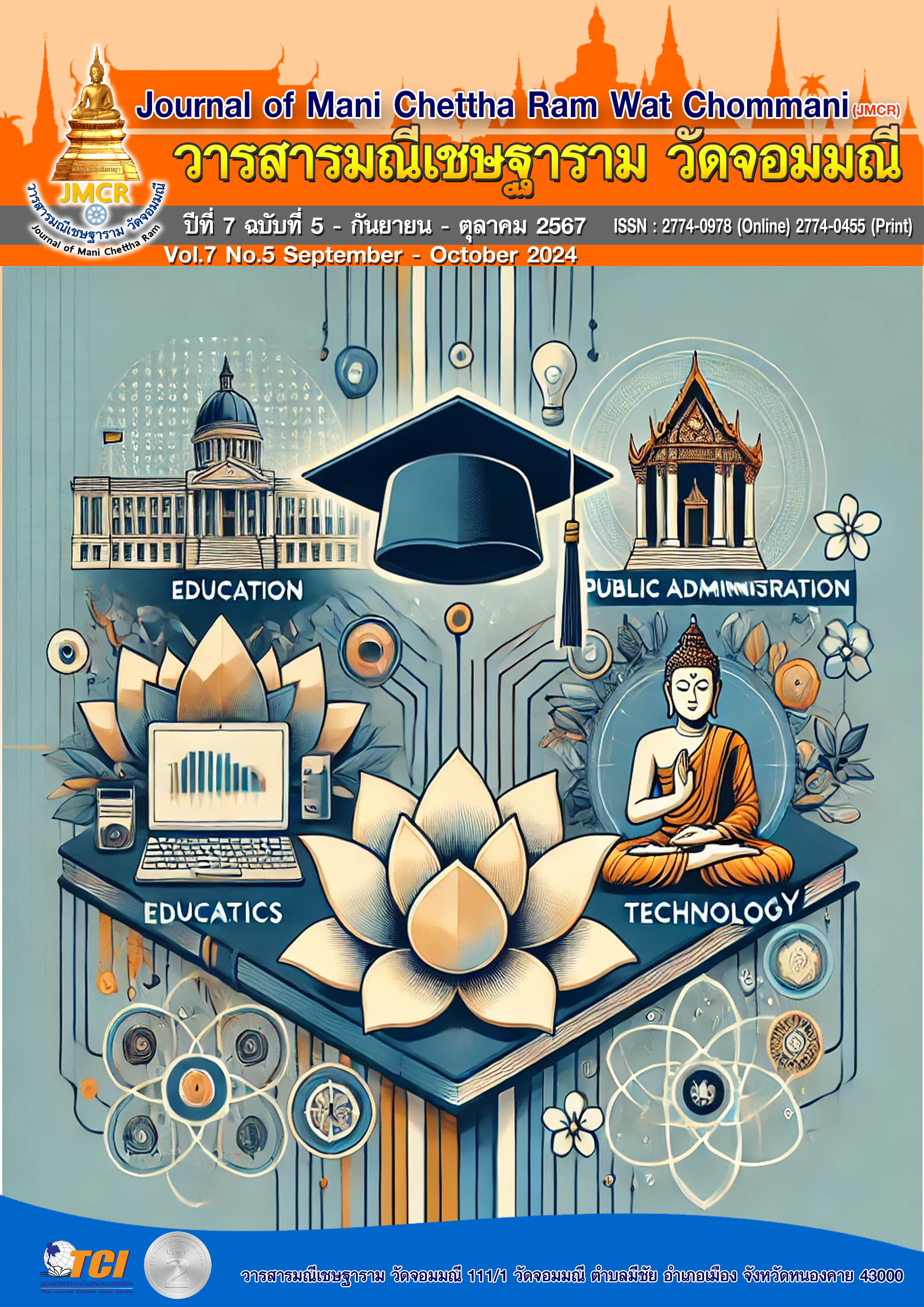TRI-SIKKHA LEARNING MANAGEMENT PROCESS OF PARIYATTI DHAMMA SCHOOLS GENERAL DEPARTMENT IN THAILAND
Keywords:
Learning management process, Three fold PrinciplesAbstract
The purpose of this article is to present the learning management process to develop skills in the 21st century. It is the educational management skill that enables monks and novices in the Phra Pariyatti Dhamma School. General Education Department Able to effectively maintain oneself in the world situation of the 21st century amidst society. The whole world of reality is changing and growing. And the virtual world in online society therefore, the process of organizing education and 2 developing skills in the 21st century It is considered an important mechanism that reflects regarding the ability of individuals to be ready to enter international society. It reflects that the process in organizing learning by the principles of the three sickkha, it is learning that gives students the opportunity to actually practice what they learn and then consider the benefits, advantages, and disadvantages according to reality by themselves and then apply that knowledge seriously in the process. Learn consisting of 3 components, it means teachers who are responsible for transferring knowledge through a process that students, that is monks and novices, actually practice. According to the principles of three sikkha (1), the precepts step allows students to choose right or wrong actions in response to situations given by the teacher in the steps related to the principles of practice called "Silasikkha", which is to control oneself in the correct way. Body and speech (2) Concentration stage It is an initial meditation practice. In controlling your mindfulness, be mindful of your breathing. To remember and be steadfast in one point. In this step, it is called related to the principle of "citta sikkhā" and (3) the step of considering wisdom. It is the final stage after practicing meditation for a period of time until being able to remember. Consider firmly with wisdom whether an action is wrong or right. Able to choose and act correctly and appropriately This stage is called "paññāsikkha". It is presented in a circular manner to create new challenges. To students that are relevant to what students need to learn and demonstrate competency according to core academic standards.
References
สุวิทย์ มูลคำ และอรทัย มูลคำ. (2545). 20 วิธีจัดการเรียนรู้ : เพื่อพัฒนาคุณธรรม จริยธรรมค่านิยมและการเรียนรู้ การแสวงหาความรู้ด้วยตนเอง. กรุงเทพมหานคร: โรงพิมพ์ภาพพิมพ์.
พระราชวรมุนี. (2521). การศึกษาของคณะสงฆ์ไทยในปัจจุบัน. กรุงเทพมหานคร: มหาวิทยาลัยมหาจุฬาลงกรณราชวิทยาลัย.
สมเด็จพระพุทธโฆษาจารย์ (ฟื้น). (2539). พระธรรมเทศนา. หนังสืองานศพ. กรุงเทพมหานคร : ผู้แต่ง
กรมการศาสนา. (2521). เอกสารสำหรับใช้ประกอบการพิจารณาเรื่องการศึกษาของคณะสงฆ์. กรุงเทพมหานคร: กรมการศาสนา.
สมเด็จพระอริยวงศาคตญาณ (จวน). (2514). พระธรรมเทศนา. หนังสืองานศพ. กรุงเทพมหานคร : ผู้แต่ง
วิชัย ธรรมเจริญ. (2541). คู่มือการปฏิบัติงานโรงเรียนพระปริยัติธรรม แผนกสามัญศึกษา. กรุงเทพมหานคร: โอเดียนสโตร์.
กองพุทธศาสนศึกษา สำนักงานพระพุทธศาสนาแห่งชาติ. (2557). คู่มือปฏิบัติงานโรงเรียนพระปริยัติธรรม แผนกสามัญศึกษา. กรุงเทพมหานคร : โรงพิมพ์สำนักงานพระพุทธศาสนาแห่งชาติ.
กองพุทธศาสนศึกษา สำนักงานพระพุทธศาสนาแห่งชาติ. (2565). แผนยุทธศาสตร์ขับเคลื่อนการศึกษาพระปริยัติธรรม แผนกสามัญศึกษา. เรียกใช้เมื่อ 10 ตุลาคม 2566 จาก https://www.debsecond.org/แผนยุทธศาสตร์พัฒนา การศึกษา.html.
สมเด็จพระพุทธโฆษาจารย์ (ป.อ. ปยุตฺโต). (2545). การศึกษาฉบับง่าย - Education Made Easy. กรุงเทพมหานคร : พิมพ์สวย.
พระมหาสุวรรณ สุวณฺโณ (จุลพงษ์). (2563). การพัฒนาทักษะชีวิตของนักเรียนโรงเรียนพระปริยัติธรรม แผนกสามัญศึกษา. บัณฑิตศึกษาปริทรรศน์ วิทยาลัยสงฆ์นครสวรรค์, 8(2), 297-306.
สำนักงานเลขาธิการสภาการศึกษา กระทรวงศึกษาธิการ. (2560). แผนการศึกษาแห่งชาติ พ.ศ. 2560-2579. กรุงเทพมหานคร: พริกหวานกราฟฟิค.
เสน่ห์ เจริญศักดิ์. (2547). การดำเนินการตามมาตรฐานด้านการจัดการเรียนการสอนในโรงเรียนพระปริยัติธรรม แผนกสามัญศึกษา กลุ่มโรงเรียนพระปริยัติธรรม แผนกสามัญสามัญศึกษา กลุ่ม 5. ใน สารนิพนธ์การศึกษาศาสตรมหาบัณฑิต มหาวิทยาลัยศรีนครินทรวิโรฒ.
พระครูวินัยธรอำนาจ พลปญฺโญ และคณะ. (2560). พุทธจริยศาสตร์กับการพัฒนาการศึกษา เรื่องความจริง ความรู้ ความดี. วารสารสันติศึกษาปริทรรศน์ มจร, 5(1), 332.
สัมภาษณ์ ผู้ปกครองในพื้นที่ชุมชน อำเภอวังน้อย จังหวัดอยุธยา เมื่อวันที่ 20 สิงหาคม 2566
Phra Dhammapitaka (P.A. Payutto). (1994). Education for sustainable civilization. Bangkok: Sahathamik Company Limited.
Office of the National Primary Education Commission. (1998). Advance to standard Learning. 12 towards life skills : ideas, guidelines for the development of children to be good, smart, happy and the power to create a beautiful world. Bangkok: Office.
Bhikkhu, B. (1982). Buddhadasa and education. Journal of Education Studies, 11 Bangkok: Aksorn Chareonat.
Phra Ratchaworamuni (P.A. Payutto). (1982). Expanded version of Dharma. Bangkok: Faculty of Dharma.




